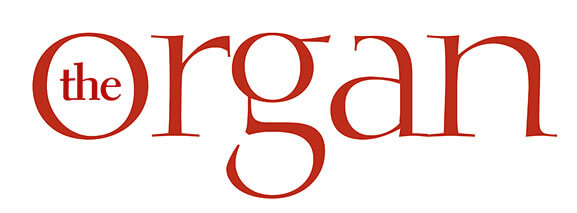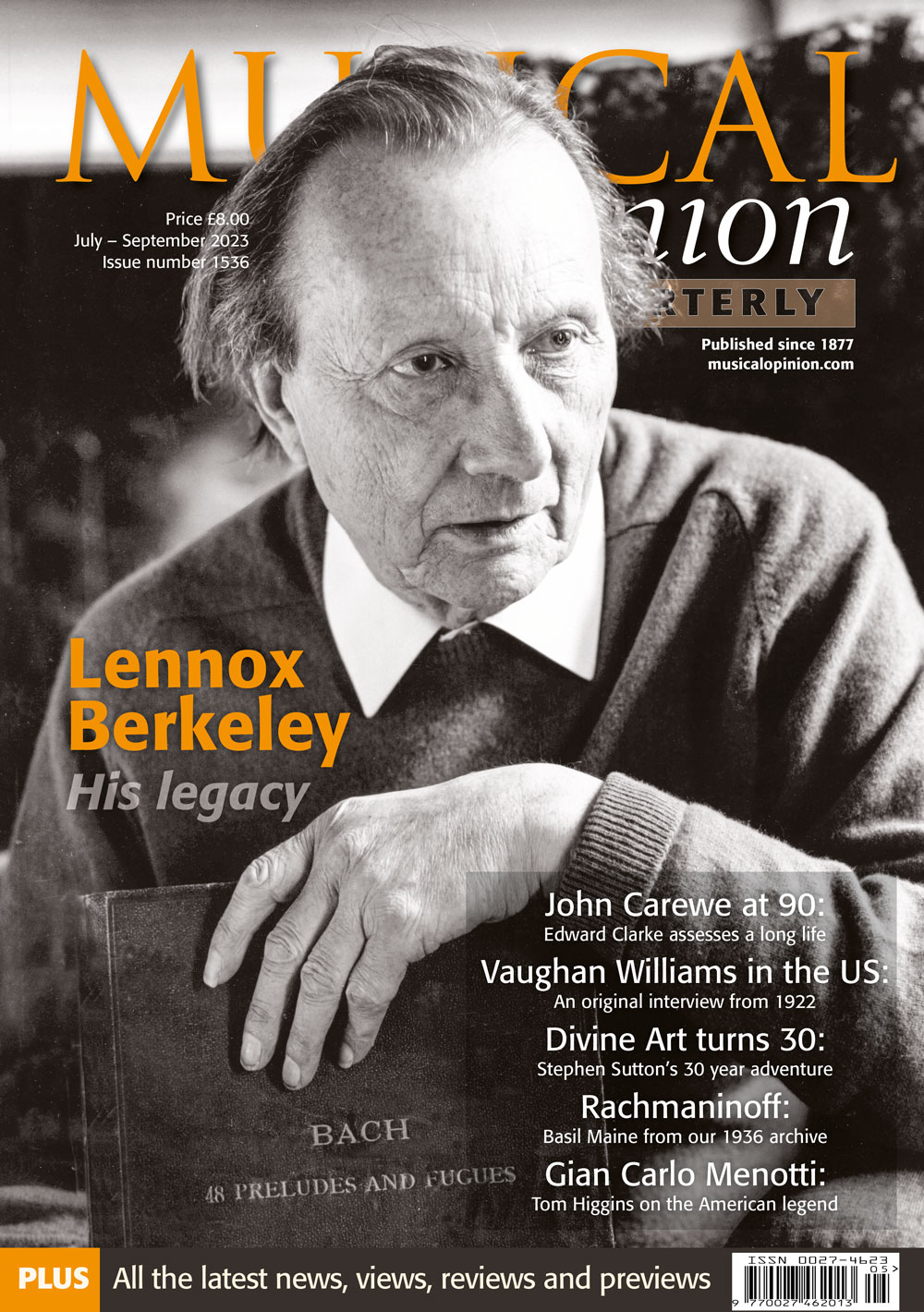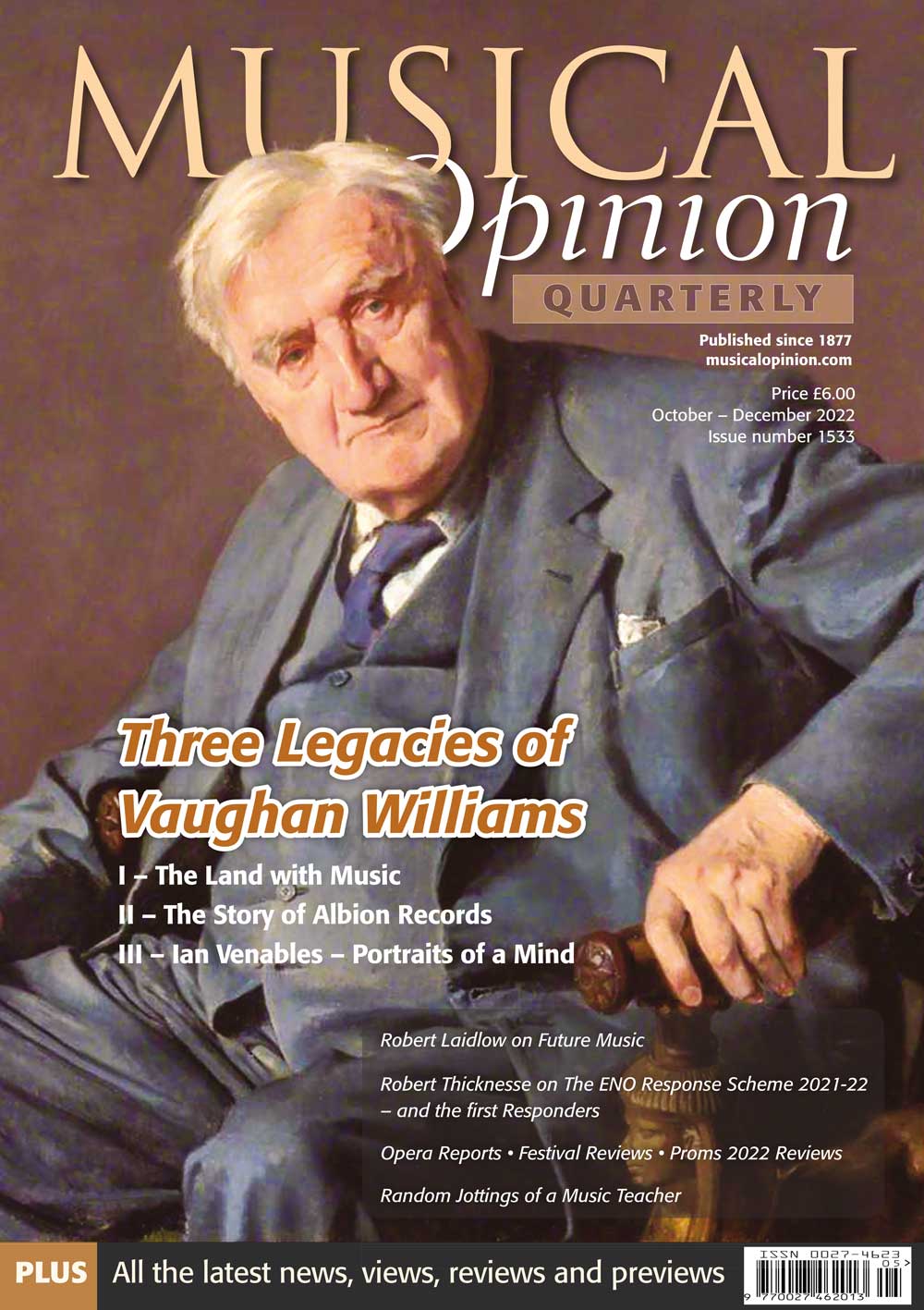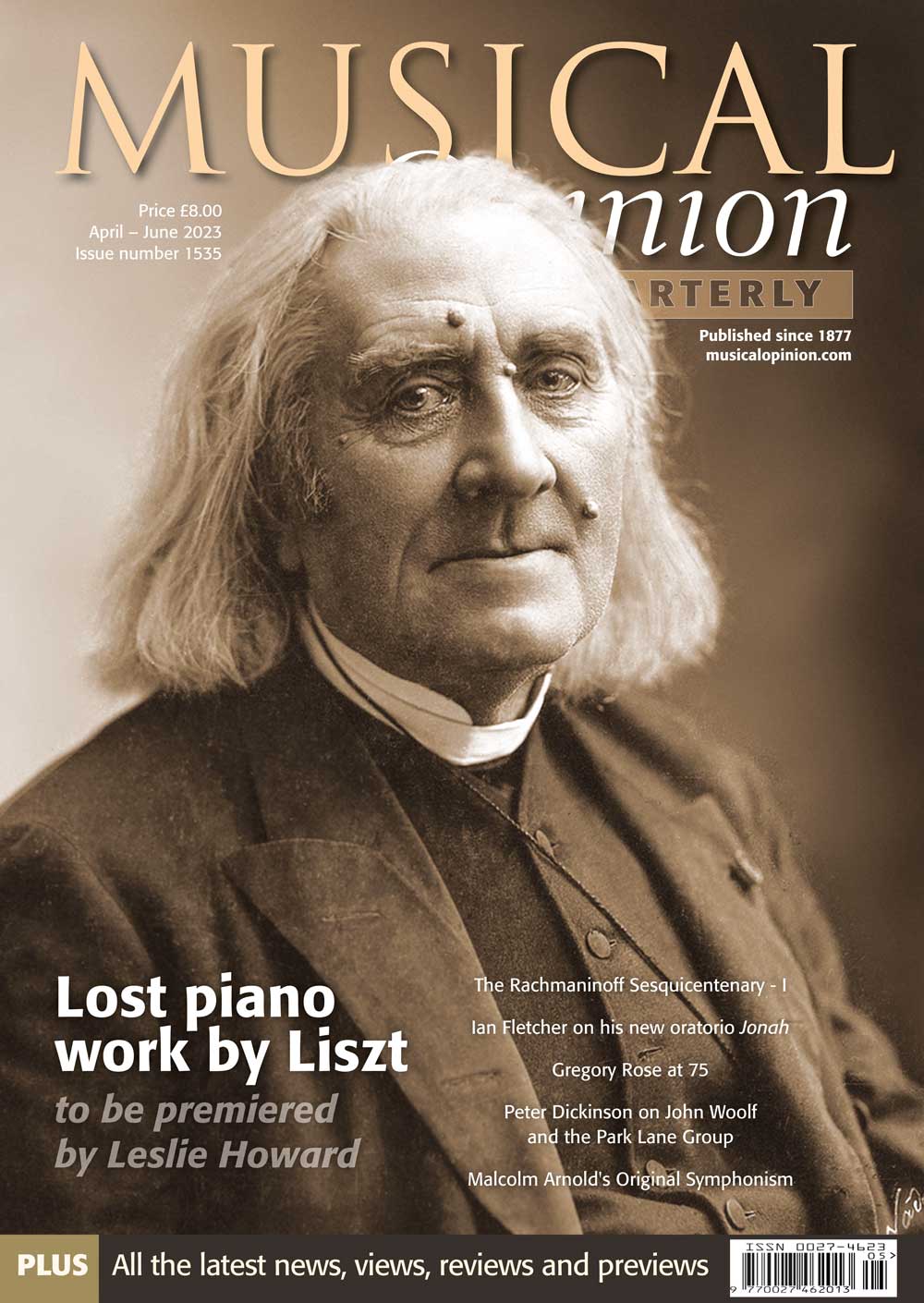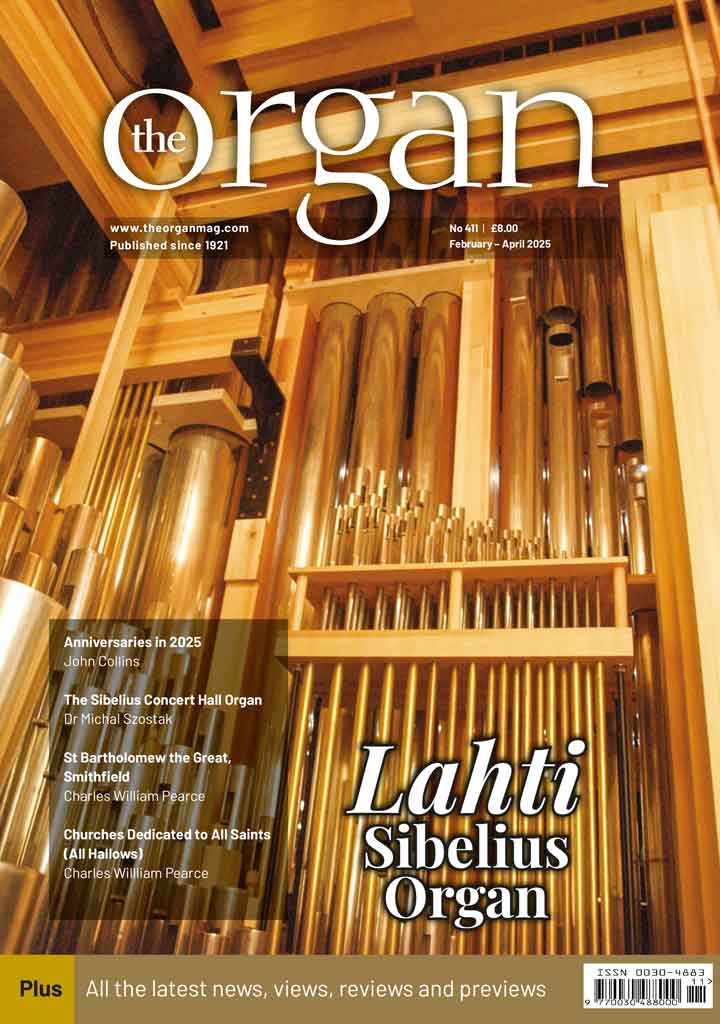

Current Issue
News
Autobiographical Recollections of Charles-Marie Widor
Autobiographical Recollections of Charles-Marie Widor Edited and translated by John R. Near Boydell and Brewer / University of Rochester Press, 2024 ISBN 9781648250866 / 298 pp / £85 (hard copy), £25 (ebook) Reviewed by Robert James Stove Brash to the nth degree will...
L’Orgue Baroque en Aragon
Jusepe Ximénez: Obra de Ileno de Premier Tono; Sacris Solemnis/Garcia Baylo (?), Pedro Pifant? (1473): Vexilla Regis/Andrés de sola: Registro alto de Primer Tono/Melchar Robledo: Domine Iesu Christe/Sebastián Aguillera de Heredia: Tiento grande de Cuarto Tono; La...
Westminster Abbey organ scholar Carolyn Craig appointed Junior Fellow at RBC
American organist and organ scholar of Westminster Abbey, Carolyn Craig has been appointed Junior Fellow at Royal Birmingham Conservatoire, part of Birmingham City University. She will take up the appointment in January 2024. Originally from Knoxville, Tennessee, and...
Registration organ competition IMOCG 2024 is open
The third edition of the Dutch 'International Martini Organ Competition Groningen' (IMOCG) will take place in the summer of 2024, in the week of 28 July to 3 August in the Dutch town of Groningen. This time, the competition will feature three monumental organs. After...
In Memoriam Peter Dickinson
Peter Dickinson died at the age of 88 on June 16, led a distinguished multifaceted career of over six decades as performer, academic, author and editor. His prolific writings and his compositional oeuvre in many genres radically espouse the postmodern aesthetic at the...
The International Kaija Saariaho Organ Composition Competition
The International Kaija Saariaho Organ Composition Competition, organised to celebrate Helsinki Music Centre Concert Hall’s new Rieger organ that is to be finished in the autumn of 2023, received 98 participating compositions from all over the world. The jury, chaired...
National Schools Singing Programme Expansion
The leading choral education programme in the United Kingdom expands to tackle declining engagement with music at state schools. Recently, the National Schools Singing Programme [NSSP], an ambitious music education initiative covering the majority of the UK’s Catholic...
Northern Ireland International Organ Competition Returns to Armargh: August 21-23, 2023
The 11th Northern Ireland International Organ Competition (NIIOC) will take place in Armagh from 21–23 August 2023, returning to the cathedral city where it was founded for the first time since the pandemic. The competition jury will be chaired by the Canadian...
Woman Composer Repertoire Day – Come and Sing
The Royal School of Church Music (RSCM) and Society of Women Organists (SWO) are hosting a joint Come and Sing event, showcasing new music written by female composers, on Saturday July 15 at St Giles Cripplegate, London EC2Y 8DA. The workshop is led by Katherine...
Applications invited for the UK’s first prep School pipe organ scholarships
Salisbury Cathedral School is proud to announce the launch of a new pipe organ scholarship programme, the first in a UK preparatory school. The new ‘Griffiths Chapel Organ Scholarships’, will support two organ scholars during Upper Prep, school years 7 and 8,...
Jens Korndörfer appointed associate professor of organ at Baylor University from August 2023
Jens Korndörfer leads a busy career as performer, educator, and church musician; he has performed to critical acclaim at prestigious venues and festivals such as Davies Symphony Hall in San Francisco, the Montreal Bach Festival, the Cathedrals in Washington, Berlin,...
New Director of Music appointed at Jesus College
Benjamin Sheen has accepted the post of Director of Music at Jesus College, Cambridge. He will join the College on 1 January 2023, succeeding Richard Pinel, who has been appointed Director of Music at St Mary’s Bourne Street in London. Ben currently holds the post of...
Bach and friends organ series
Details of Bach and Friends: The Orgelbüchlein Completed series presented by the Royal College of Organists and sponsored by Professor Christopher Wood. This will comprise the following ten events: Saturday 24 September 2022 Temple Church, 10am - ‘Laws and Canons’...
Cathedral organists rejoice in newly installed Woodstock practice organ
A two manual Vincent Woodstock practice instrument has been installed in the Song School at Peterborough Cathedral. The organ was constructed in 2011 and became available when its owner, Simon Johnson, moved from his role as Organist at St Paul’s Cathedral to become...
Visually Impaired Teenager Wins Prestigious Musical Scholarship
Sixteen year old Ivan Deb has won the first Aprahamian Scholarship for young organists which includes a brand new two-manuals-and-pedals home organ, on which he can practise. The Arabesque Trust, which set up the scholarship to help visually impaired young organists,...
Explore By Topic
A new starter instrument for the United Kingdom: The Keyboard Studies Programme Melodica
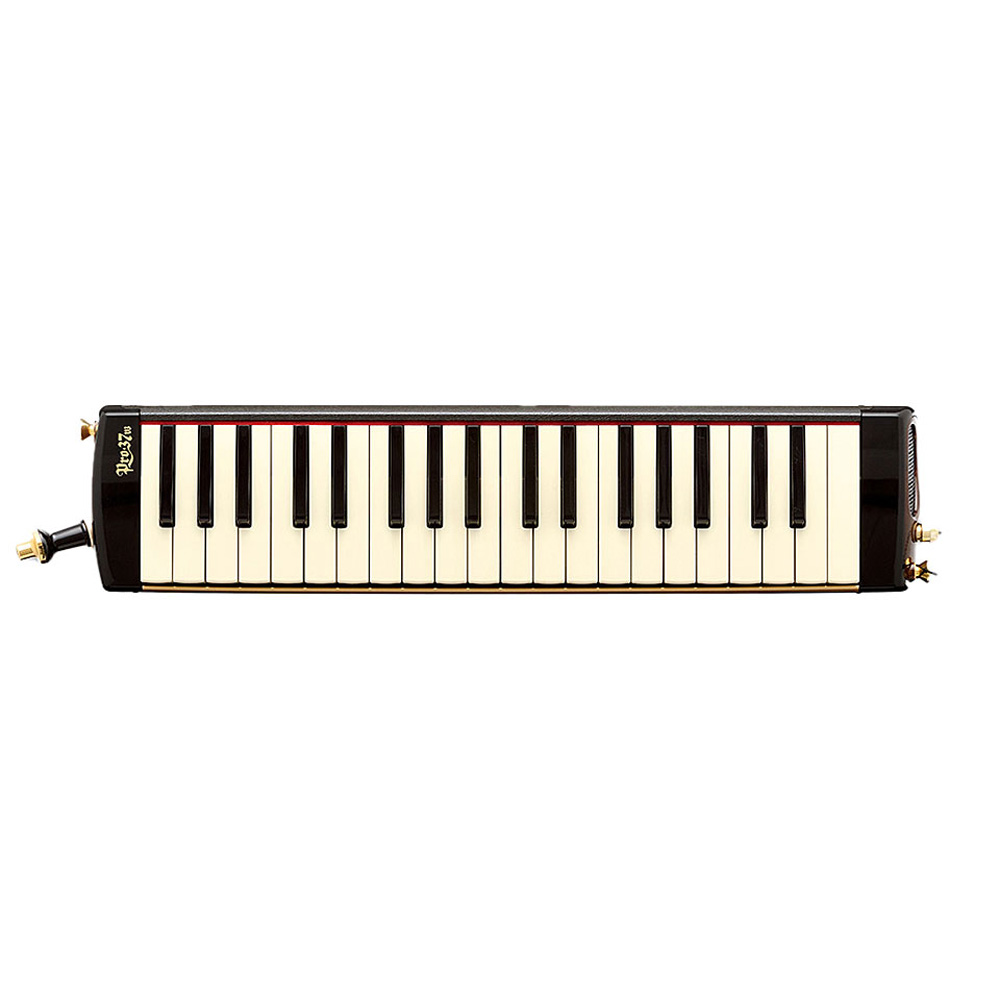
It is no secret that music education in the UK has suffered as a result of cuts in budgets, and the pandemic has only further reduced opportunities for British children to engage with music. It is vital that music education survives in schools, if not for the personal, social and educational benefits to students, then for the cultural importance of maintaining the high standard of the UK’s musical pedigree.
The National Keyboard Studies Programme, funded by the Hamish Ogston Foundation, has found an ingenious, engaging and low-cost solution to prevent the rapid decline in UK music education – the melodica. This instrument, also known as the ‘Melodion’ by the leading manufacturer of music education supplies, Suzuki, will not be consigned to the side-lines of music history. The melodica is a hand-held keyboard instrument, powered by blowing air through an attached mouthpiece. It has featured in wide-ranging musical styles from minimalist works by composer Steve Reich to arrangements by Grammy Award winning musician Jacob Collier.
The popularity of the Melodica is soon to be more widespread as it is now appearing in classrooms in the UK, resonating with the country’s youngest musicians through the innovative music education initiative, The Keyboard Studies Programme. Initially established by the Diocese of Leeds, the programme has followed the example of countries such as Japan and Germany and is using the melodica as a starter instrument for young musicians. The advantages of starting aspiring musicians in primary schools on the melodica are clear: as a fun, portable, inexpensive, zero-maintenance instrument, the melodica is extraordinarily resilient to increasingly stretched school budgets and storage facilities.
The programme itself benefits from a simple structure which gives students a clear progression route from the melodica to the organ. The idea of providing young people with the possibility of a long-term trajectory resonates with the programme’s sole supporter, the Hamish Ogston Foundation. The Keyboard Studies Programme is supported by the Foundation, which has provided £750,650 over five years to establish the largest and highest-quality teaching school in the UK for keyboard instruments, using the melodica for whole-class primary school teaching.
Currently, the Keyboard Studies Programme reaches 830 pupils within the whole-class programme and 150 individual lessons are being given to students who have gone on to study the accordion, piano and organ. This initiative is not only about providing the UK’s next generation of musicians with their first access point in music, but also a framework for those who want to progress.
The fact that the team of progressive music educators in Leeds are making this programme work with such success bodes well for the rest of the UK. Looking to the future, there are now plans for the expansion of The Keyboard Studies Programme alongside the current roll out of the National Schools Singing Programme. The Singing Programme is another musical initiative supported by The Hamish Ogston Foundation which is bringing expert-led singing sessions into Catholic state schools across the UK with schools in Dioceses from Portsmouth to Aberdeen all taking up the cause. At the inaugural National Schools Singing Programme Conference in early March, Hamish Ogston announced the Foundation’s intention to provide funding for further Keyboard Studies Programmes in areas that had established financially sustainable Singing Programmes.
With the combined efforts of both programmes, the intervention of the Hamish Ogston Foundation is timely. It is no secret that music budgets in schools have suffered severe cutbacks over several years and the pandemic has had a catastrophic effect on the music industry. Last year, a report by researchers at Birmingham University predicted cuts in government funding could result in A-levels in Music completely disappearing in some regions of the UK in just over a decade; another report by Ofsted showed that average access to musical education in state schools is worse now than it was even 30 years ago. The financial support and the strategic thinking being carried out provides a much-needed remedy to such musical maladies.
